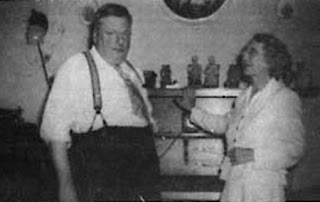 |
| Invermay Hotel, c. 1915. From Parkland Trails (1986) |
 |
| Invermay, c 1910 Source |
The Invermay Hotel was built by Anthony Turner in 1905 to accommodate the influx of settlers brought in when the railway came through. Despite the fact that the bar was closed due to Prohibition, Robert and Nellie Coleville bought the hotel in 1917. The couple, with their six children, operated the Invermay Hotel until 1929.
 |
| Gladstone M. Ferrie, c. 1950. From Parkland Trails (1986) |
Gladstone (Glad) M. Ferrie and his wife Mabel (Mabs) took over the operation of the Invermay Hotel in 1929 and ran it for 28 years. Glad was born in Denver, Colorado, in 1892. He came to Canada in 1906, and farmed in the Rama district. He served as a corporal in the 2nd Engineers of the Canadian Armed Forces during the First World War. After the war, he resumed farming with Mabs and started a family of three boys and one girl. Mabs was a nurse, and since the closest doctor was in Canora, there were many times when she was called on to serve as a midwife. The couple decided to move to Invermay and buy the hotel so their children could attend school in town.
The hotel business suited the gregarious Glad very well. He loved people and his greatest pleasure was serving the public. This he did in a variety of capacities, first as hotelkeeper, then as reeve of the Rural Municipality of Invermay, and eventually as a Liberal Member of Parliament for the MacKenzie constituency from 1945 until 1954.
The dining room of the Invermay Hotel was the Ferrie family’s headquarters. The freight train stopped in town every day at noon and for many years meals were served to the crew. Meetings of the Rural Municipal Council were held in the hotel, and the members usually had their meals in the on council day. The RM Council’s annual Christmas dinner was served at the hotel for several years. After the Second World War, the hotel dining room was converted into a lunch counter.
The Ferrie children were expected to help out with the hotel operation. The boys hauled water from the town well. “A familiar sight around town was our Scotch collie, Don, pulling the sleigh loaded with cans of water,” Ben Ferrie recalls in the Invermay local history book. (Parkland Trails: Histories of the R.M. of Invermay and Villages of Invermay and Rama, 1986) In 1950, the Ferries had a well dug on the north side of the hotel which supplied good drinking water for themselves as well as for others in the community. Glad also worked as a cattle buyer during the years he owned the hotel. He travelled to Winnipeg on the cattle train every Saturday, returning by passenger train the following Tuesday.
 |
| Glad and Mabs Ferrie, c. 1950. From Parkland Trails (1986) |
Glad passed away in 1955 after a lengthy illness. His wife Mabs nursed him at home until the end. His youngest son Russ managed the hotel along with his wife Leona until 1957 when they sold it to Steve Kohan.
 |
| Invermay Hotel, June 2006. Joan Champ photo |
© Joan Champ 2011
View Larger Map










